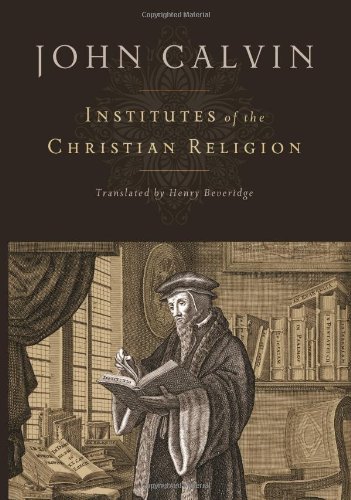Reflections on Father's Day
I frequently joke that I have read ~95% of Calvin's Institutes of the Christian Religion three or four times. I have never read the thing straight through — on my last attempt making it to Book IV. I have no idea what portions remain unread. And yet, I have repeatedly re-read chapters and large sections of the Institutes for writing and personal study.
Generational Promises
Though I have many favorite sections, one of the most memorable of Calvin's quotes comes at the end of the chapter on Infant Baptism. Here, Calvin addresses some of the more practical aspects of baptizing infants into the community of Christ. This section was particularly influential in rectifying my (then) non-Reformed "Calvinism" (Predestinarian theology) with the washing of babies (covenant theology) — something even some PCAers still struggle with to this day. Reading and discussing this passage was especially beneficial for my wife who was neither Reformed nor paedobaptist. Here God's love is expressed not only through individual election, but His covenant promises to our posterity,
"For how sweet is it to pious minds to be assured not only by word, but even by ocular demonstration, that they are so much in favour with their heavenly Father, that he interests himself in their prosperity! Here we may see how he acts towards us as a most provident parent, not ceasing to care for us even after our death, but consulting and providing for our children. Ought not our whole heart to be stirred up within us, as David’s was (Ps. 48:11), to bless his name for such a manifestation of goodness? ... For it is no slight stimulus to us to bring them up in the fear of God, and the observance of his law, when we reflect, that from their birth they have been considered and acknowledged by him as his children. Wherefore, if we would not maliciously obscure the kindness of God, let us present to him our infants, to whom he has assigned a place among his friends and family, that is, the members of the Church."(Institutes, IV.XVI.XXXII)
The big marker here is Calvin's insistence that God's grace and glory are strongly presented in the promises He makes that extend beyond our individualism. Our God is the maker of generational promises. Calvin means this to spur us in our hearts and minds. It's to be encouraging and joyous for our minds to dwell on. I'd like to extrapolate this slightly to husbands and fathers.
Husband through Fatherhood
The internet is replete with articles on how couples with kids can improve their marriage through the chaos of parent-life. Children keep parents busy, and the parent-lifestyle presents no similarities to the dating/courtship/honeymoon/etc lifestyle of early love. In those early days, man and woman address one another on an uninterrupted individual-to-individual basis. This is an immeasurably valuable time.
But with the introduction of children come distractions from one another. And so, with much Godly intent it is often recommended that husband and wife carve out time to "strengthen" their marriage during the days of children — or "make time to return to a pre-kid experience." I do not want to disregard or disrespect the advice in these articles. Many times they are quite good. But the one sub-theme that continues to bubble to the surface is that "working on marriage" means "time apart from the kids."
Hear me clearly, time apart from the kids is essential (if only by putting them into their own beds each evening). What concerns me is the amount of time seems to become increasingly exaggerated as we become a more individual-centric society. Without losing the advice of dating our spouse, I'd purpose the addition of a more theocentric layer. Certainly, the original promises of a husband are to love his wife, and these promises begin as individual promises. But if Calvin is correct ("how sweet is it to pious minds" for God to be promised to posterity), should not our parental promises communicate marital love? Or as Calvin put it "Ought not our whole heart to be stirred up within us" when love is shown for our children? This aspect of marriage — strengthened through love, care, and time with our children — has been lost.
Marriage in the age of romanticism and individualism has taken one glorious aspect and focused on it too strongly. I would argue Marriage best accrues strength in the midst of children through mutually shared love, respect, and care for the posterity of the marriage. In Christlike care for children, husband and wife communicate to one another apart from individualistic language. In this care for the generations, a unique language of love is promised to one another. Equal dedication to the education, upbringing, and provision for children bring a couple together in a unique way — they are united in seeing God's promises fulfilled in their children. This unity reflects the glorious generation-crossing promise of God Himself,
“As for Me, this is My covenant with them,” says the Lord: “My Spirit who is on you, and My words that I have put in your mouth, will not depart from your mouth, or from the mouth of your children, or from the mouth of your children’s children, from now on and forever,” says the Lord. — Isaiah 59:21 (HCSB)
So fathers, on this day, dedicate yourself to your wife. Love them as Christ loved the church. And if God has blessed you with children, dedicate yourself to your wife by dedicating yourself to her children and her children's child. Whether biological, adopted, or spiritual, the glory of God's promises extends generationally — love the children of your wife. For fathers, the quality of our husbandhood is reflected in our commitment to multigenerational fatherhood.







